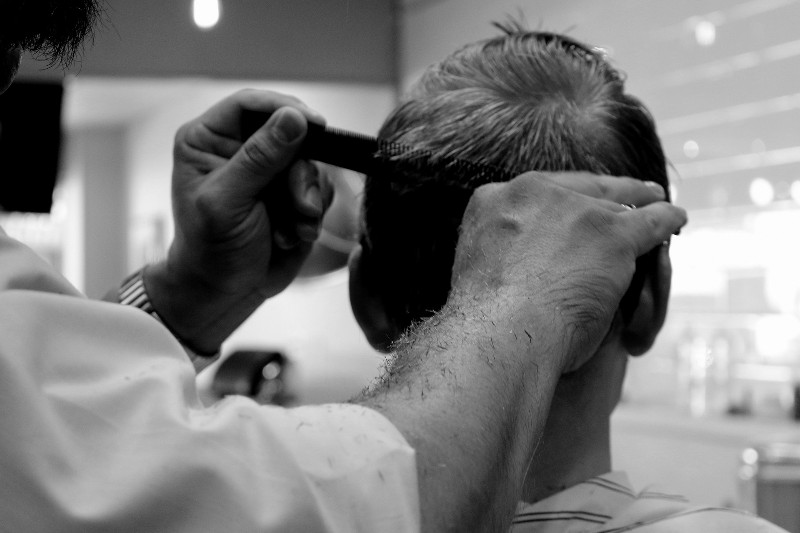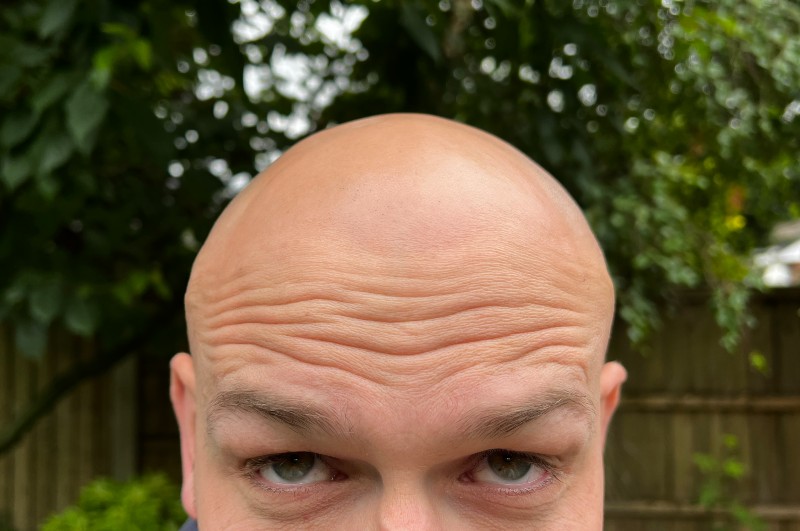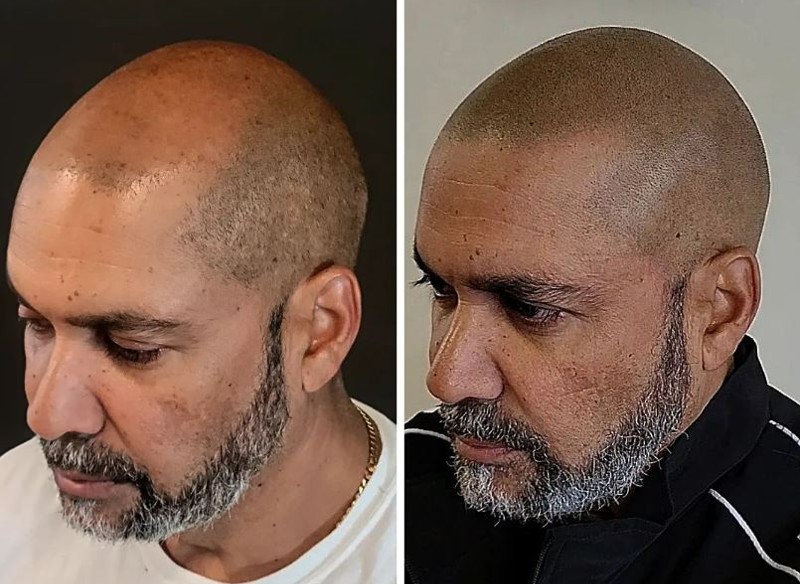A lot of people wonder about the links between baldness and the decomposition of hair.
When you lose hair, is the hair dying, and is it breaking down? Is there any way of stopping that?
I’ve done a ton of research to see if baldness is related to decomposition, and in short:
- Baldness and decomposition aren’t linked, at all
- Hair takes AGES to decompose
- But weirdly, when it does, it’s a great fertilizer for plants
Want to know more? Read on.
Does human hair decompose?
Human hair does decompose, although it can take a very long time to do so. It decomposes because it is made of organic matter – the main component of hair (making up about 95% of its structure) is a protein called keratin, which is also the substance that forms part of our skin and nails.
All organic matter decomposes, but in different ways and over different periods of time. It depends on the specific matter and the conditions it is exposed to.
Does hair dissolve?
Keratin does not contain any water, and it is insoluble – it won’t dissolve and it is waterproof. This helps to slow down the decomposition because water can only help the hair to decompose from the outside. Many other organic substances that are soluble will soak up water and therefore decompose internally as well as externally.
This means that hair is one of the more durable organic substances, and so depending on the conditions it may seem like it never decomposes, although it eventually will.
How long does it take for hair to decompose?
Hair takes a very long time to decompose, and if preserved in a dry environment it can often last tens, hundreds, or potentially even thousands of years if the surrounding area is sealed. Hair dissolves fastest when wet, where it may take one to two years for it to break down.
Because hair takes so long to decompose, we don’t really have accurate estimates on average times – it’ll usually outlive us. Human hair either tends to get buried inside a casket where it is kept sealed (and preserved quite well) or it is burned up.
And once human hair has either fallen out or been cut, we don’t tend to leave it alone to monitor how long it takes to decompose.

So what do we know? We know that hair that has been sealed away in dry conditions will survive many years. Some mummies have even been discovered in tombs from Ancient Egypt times that have intact hair.
And we have been able to observe that, when wet, hair will typically decompose a lot faster. While it is waterproof, the water will over time wear down the keratin.
You know how your nails soften if you stay in the bathtub for a long time? And remember how hair and nails are made from the same substance? That’s why human hair will soften and then ultimately break down in water.
Baldness and decomposition of hair
There isn’t any relationship between baldness and the decomposition of hair. Baldness is not caused by hair decomposing faster than it should. The two are unrelated. The main cause of baldness is the shrinking of the hair follicles, but the follicles are not decomposing.
Everybody loses hair every day – typically between 70 and 100 hairs on average (source). Baldness occurs when you aren’t growing the hair to replace it. So it’s not like the hair itself is dying faster – it’s just because the follicles aren’t working as they should.

And there are many potential causes for that, including hereditary conditions, stress, medications, and so on. But none of those are causing any part of your hair or scalp to decompose. The decomposition of hair is a completely unrelated subject.
To be clear, that doesn’t mean that you can be flippant with haircare. If you have started balding and can see your scalp through your hair, it doesn’t mean it’s decomposing but it does mean you need to take action.
That might be trying treatments like Minoxidil or Finasteride, scalp micropigmentation (see below), or even a hair transplant, which is a permanent solution. In case you were wondering, hair transplants don’t hurt as much as you’d think.

Or, it could be simply embracing your hair loss and shaving your balding head.
But your hair isn’t actually dying and decomposing when you go bald. Your hair cells are already ‘dead’. They’re just not being replaced with new dead hair cells when you do start to bald.
The hair itself will decompose at the same rate whether it is in your head, or it has fallen out. Some chemical products may damage your follicles (although anti-dandruff shampoo like Head & Shoulders doesn’t – despite some rumors) but they aren’t directly causing decomposition.
Does hair decompose after death?
Death isn’t linked to the decomposition of hair. Hair will decompose at the same rate for someone who is alive and someone who is dead. The hair, once it has grown through the skin, is already ‘dead’ cells that have been grown.
So whether hair decomposes after death depends upon the storage of the hair. We already know that hair decomposes much faster when it is exposed to water, but if it is left in a sealed and dry location then it will decompose at an extremely slow rate.
This means that, once you die, if you are buried in a wooden casket your hair may be preserved for a very long time. Whereas if you choose a biodegradable casket, your hair will be exposed to the soil and will decompose.
Obviously, if you are cremated your hair won’t decompose – it’ll burn.
Does hair decompose in soil?
Hair will decompose in soil faster than it would do if left out in the open. The combination of minerals in the soil, and the moisture, will accelerate the decomposition process. It’s still slow, but expect it to take one to two years, instead of much longer.
But it’s worth knowing, because hair can actually be used as a fertilizer for plants. Once the decomposition process starts, hair will begin to release nitrogen.
Nitrogen is a vital component to help plants grow, and despite the abundance of it in the air surrounding us, plants won’t harvest it in that form. So instead, we often use chemicals like ammonia as fertilizer, to provide nitrogen directly into the roots.
Human hair is obviously much healthier than ammonia since it isn’t a harsh chemical, so used as a fertilizer it can be a much more environmentally-friendly choice.
But don’t forget about the downside of that long yield time – if you add hair to your soil, it won’t have an immediate impact. Instead, use it for plants with longer growing times and they will benefit more.
It’s also important not to add any hair to soil that has been chemically treated, such as bleached or dyed hair. Those chemicals can also get into the soil and will be harmful to your plants.
Does hair decompose in the drain?
Human hair will decompose in your drain pipes, but again it’ll still take up to two years. If you have a clogged drain you can hardly wait that long for the clog to break down, so you’ll normally need to take other actions to remove the hair.
There are plenty of chemicals that are corrosive and can help to destroy hair, which will remove any clogs in your drain. Just be careful as corrosive chemicals can also destroy the pipes themselves. Use specialist products for the job which are balanced in the right way to destroy the blockages without damaging the drains.
If your toilet has become clogged with hair – say someone has decided to throw hair clippings in there instead of in the trash – you should be more careful with using chemical agents designed to destroy specifically hair.
When hair is destroyed in this way, the reaction will release heat. While plastic and metal pipeworks can sustain this heat, porcelain may crack. So with toilet blockages in particular, try to use tools rather than chemicals.
If the blockage seems to be further down the toilet and into the pipes, then usually dissolving products will do.
Does hair decompose after being cut?
Hair that has been cut will decompose at the same speed as hair still in the head – it depends on the conditions in which the hair is kept. If cut hair is kept in a dry location away from bacterial enzymes, it’ll last for a very long time.
So actually, if you’ve had a haircut it can be a bad thing to throw the cuttings out in the trash. It might take a long time to break down.
Using cut hair as soil fertilizer, or throwing it in your compost bin, is the best thing you can do with it. Even if you aren’t a keen gardener, you’re at least helping it to break down faster.
Summary
So there you have it. If you’re going bald, your hair isn’t decomposing – which would sound a bit gruesome. Or at least it’s not decomposing any faster than someone’s hair which is thick and full.
Baldness isn’t caused by decomposition, and the hair of a balding person will still last a very, very long time – just not in the head.
I’d recommend composting your hair if you can, even if you don’t plan on growing plants. You could always donate the nitrogen-rich compost to that keen gardener in your neighborhood.
Interested in reading more about hair science? Here’s a look at whether salt water is good for your hair.

